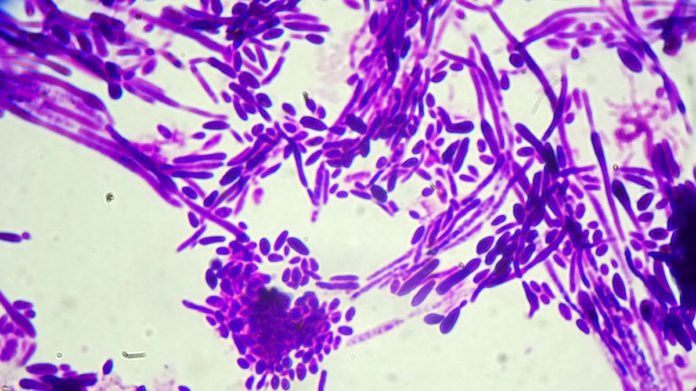Invasive fungal infections are notoriously difficult to treat. There are only three classes of drugs approved for invasive fungal infections, whereas with bacterial infections we have an array of antibiotics at our disposal. As described in The Lancet, fungal infections are a neglected area of public health, with around 1.5 million deaths and 11.5 million life-threatening infections worldwide each year.
Bright Angel Therapeutics is a Toronto-based company focused on developing new therapies for treating drug-resistant fungal infections. The group was co-founded by Leah Cowen, a University of Toronto Professor of Molecular Genetics, whose lab is at the forefront of this battle.
Unique challenges in developing treatments
The Cowen Lab’s interdisciplinary team is researching the genes that influence the behaviour of pathogenic fungi that make us sick. This will help us understand how they attack humans and why they are becoming more and more resistant to antifungal drugs. They are also testing various substances to see whether they can weaken or destroy these organisms.
One of the reasons why these infections are so hard to treat is because humans are more closely related to fungi than bacteria or viruses, so it’s difficult to develop a treatment that doesn’t harm the patient. Other reasons are that fungi have cellular walls that are difficult to penetrate and the use of our limited number of antifungal drugs is increasing resistance.
“Antifungal resistance is a serious unaddressed problem that affects patients around the globe. Diagnosis of invasive fungal infections is often difficult, and these life-threatening infections can be difficult if not impossible to cure with current treatments,” said Dominic Jaikaran, Bright Angel Therapeutic’s CEO, to Toronto Innovation Acceleration Partners.
A prime example is Candida auris. This mysterious and destructive pathogen is highly contagious, can survive for weeks on surfaces, and has a mortality rate of between 30-60%, mostly among patients with underlying conditions. It is resistant to all three antifungal drug classes.
It’s unclear how it emerged, but the first reports came in 2009 from Japan when an elderly patient was found to be living with a novel drug-resistant fungus. Today, it has been identified in dozens of countries worldwide including Canada.
One of the Cowen Lab’s greatest advances involves a protein in the fungus called Hsp90 (heat shock protein 90) which is expressed in humans as well. Hsp90 is what’s known as a ‘chaperone protein’, meaning that it assists other proteins to carry out their roles.
Importantly, it also helps cells deal with stress including damage via exposure to toxins. Hsp90 has been shown by Cowen’s team to be central to C. auris‘s resistance to antifungal drugs and has subsequently become a key target for treatments. A paper published in 2019 described their success with regulating the genetic expression of Hsp90, which ultimately leaves C. auris exposed.
Cowen Lab’s innovations generating investor interest
Targeting Hsp90 is now the lead program for Bright Angel Therapeutics, and investments and partnerships have come knocking at their door. Venture capital firm Lumira Ventures and Viva Biotech joined the ranks of Bright Angel Therapeutics’ list of investors late last year.
“Bright Angel is developing fungal-selective inhibitors of Hsp90 as a new treatment strategy for life-threatening invasive fungal infections,” commented Zhixiong Ye, Chief Scientific Officer at Viva Biotech, to Bloomberg.
“The first-in-class compounds being developed by Bright Angel are designed to enhance the efficacy of all three major classes of current antifungal drugs and thwart resistance to them by targeting a fundamental mechanism in fungi that enables resistance to arise.”
Regarding the investment announcement, Jaikaran re-emphasized the company’s mission to fill in the gap of this major public health issue.
“The magnitude of the global health threat we’re facing is clear from the fact that the U.S. Centers for Disease Control and Prevention recently added Candida auris and azole-resistant Aspergillus fumigatus to their Antibiotic Resistance Threats Report.” said Jaikaran. “They join drug-resistant Candida on the list of urgent public health challenges.”








































